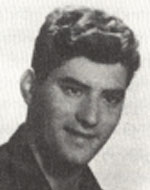Moshe, son of Aliza and Michael, a survivor of the Holocaust, was born on August 24, 1954 in Moshav Betzet. He studied at the elementary school in Kibbutz Gvat, and later continued his studies at the ORT vocational high school in Afula with the aim of electricity. When Moshe (also known as Moshele) was a month old, his family moved from Moshav Betzet to the Gvat group, where he grew up, and when he was seven he was orphaned from his mother. Moshe was an active child, both in the school class and in the youth movement of the kibbutz movement. He took part in the Gadna activities at the ORT school and was very interested in swimming and was a basketball player and member of the Eitan basketball team, He loved the surroundings of his place of residence, the vegetation and the landscape, and he used to grow and cultivate plants, he raised fish in the aquarium, he had a large collection of stamps from the countries of the world and from the land and was always kind and loving. He was exuberant and cheerful, but mentally sensitive, very withdrawn, and did not usually talk to friends about his personal interests or thoughts. He always loved his family, treated his parents with understanding and always stood up to his younger sisters, he was not afraid of work, and according to his friend in the army, he never knew how to overcome his difficulties. In his youth he worked diligently in the barn, and by the time he was drafted into the army, he worked as an electrician in the farm and at the Palestro factory, and even during his brief vacations from the army, he happily filled every job he was assigned. He planned to travel abroad after completing his army service. Moshe was drafted into the IDF at the end of October 1972 and was assigned to the Armored Corps, where he was assigned to the Armored Corps, first in the rear and later on the Suez Canal. And after that he returned to his army base in Sinai, but because of his medical classification, he was supposed to be sent to the center of the country for six months, while in the Sinai he worked temporarily in the base office. He always said he felt safe in the tank, and he wanted very much to be a tank commander, but because he had hepatitis, he did not When the Yom Kippur War broke out, Moshe volunteered to return to his company, a tank driver, and went out with his unit to greet the Egyptians in the northern sector of the Suez Canal, during the battle that took place near the ” A few hours after the war, Moshe moved in his tank to help rescue the company commander’s tank, which sank in the swamp, and the tank was hit by enemy fire and Moshe was killed. – The cemetery in Gvat. Survived by his parents, two brothers (one of them his twin) and three sisters. After his fall, he was promoted to corporal. In a letter of condolence to the bereaved family, the unit commander wrote: “Your son was loved by his commanders and friends, and he was prepared to carry out any mission.” His kibbutz dedicated “Diary of the Gibbet” on December 27, 1973, in his memory, and brought in it the words of family members and members of the family and fragments of his letters; He also published a booklet in his memory, which included the words of the family members and members’ accounts of his character.
